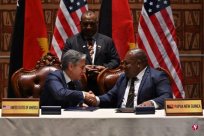
The European Commission first communicated Huawei and ZTE for the first time, marked as a telecommunications supplier that constitutes a higher risk for the security of the European Union, and announced that it would no longer adopt services that rely on these two Chinese telecommunications companies.
Agence France -Presse reported that the European Commission issued a statement on Thursday (June 15) saying: "We believe that compared with other 5G suppliers, Huawei and ZTE have essentially constitute a higher risk."
Statement said that the European Commission "will take relevant security measures to avoid purchasing new connection services to rely on these two suppliers' equipment."
Thierry Breton, the EU's internal market commissioner, called on 27 member states and telecommunications operators to exclude Huawei and ZTE equipment outside their mobile network.
Bolong's press conference in Brussels said: "We cannot continue to rely on equipment that may become 'weapons' and attack EU interests. For our common security, such a fatal weakness is too risky."
According to Bloomberg, in order to stop the key infrastructure, Chinese equipment was used, and the European Commission issued a new set of new guidelines on Thursday, urging EU member states to gradually eliminate high -risk suppliers in the telecommunications network.The EU Commission's corporate communication system has also been banned from adopting Huawei and ZTE equipment.
The European Union Commission said that about 24 EU member states have developed rules or are laying a foundation to give the official power in this regard.
But Bulles did not name it that only 10 member states used these specifications to limit or exclude high -risk sellers. "This speed is too slow, which constitutes a major security risk, which makes the EU collective security exposure to risks in risks."
The European Commission introduced strict 5G specifications three years ago, and no supplier or named Huawei did not publicize at that time.The statement on Thursday represents the EU's increasingly tough route in terms of policies for China, but at the same time still maintains relations with Beijing.



